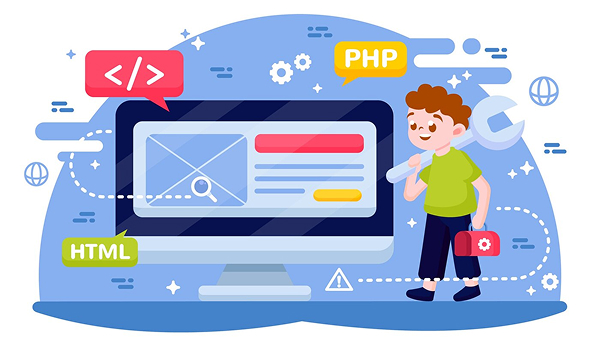Introduction
PHP, originally created by Rasmus Lerdorf in 1994, started as a simple set of Common Gateway Interface (CGI) scripts to track website visitors. Over time, it has grown into a full-fledged, dynamic language powering 80% of the web. While early versions of PHP were criticized for messy, unstructured code, the language has evolved significantly to meet the demands of modern web development.
The Early Days of PHP
In its early stages, PHP was primarily used for basic server-side scripting. The introduction of PHP 3 in 1998 brought greater extensibility, and PHP 4 in 2000 introduced the Zend Engine, improving performance. However, these versions still lacked features needed for scalable, secure applications.
Challenges with Legacy PHP
-
Spaghetti Code: Early PHP applications lacked structure, leading to poor maintainability.
-
Security Issues: Poor input validation and lack of built-in security made applications vulnerable.
-
Limited Object-Oriented Support: While PHP 4 had some OOP (Object-Oriented Programming) features, they were minimal.
The Transition to Modern PHP
The real transformation of PHP began with PHP 5 in 2004. This version introduced full-fledged OOP, the SimpleXML extension, and better error handling.
Key Features of PHP 5
-
Introduction of PDO (PHP Data Objects) for secure database interactions
-
Better memory management and performance optimizations
-
Improved exception handling
Despite these improvements, PHP 5 had limitations, such as weak support for asynchronous programming and slower execution compared to emerging alternatives like Node.js.
PHP 7: The Game Changer
Released in 2015, PHP 7 brought massive performance improvements and modern features. Here’s what made it a significant upgrade:
Performance Enhancements
-
Twice as fast as PHP 5, reducing server resource usage
-
Introduction of the OPcache extension for faster script execution
-
Reduced memory consumption, making PHP more efficient
New Language Features
-
Scalar Type Hints (int, float, bool, string)
-
Return Type Declarations for stricter coding standards
-
Null Coalescing Operator (??) for better conditional logic
-
Spaceship Operator (<=>) for easier sorting comparisons
-
Anonymous Classes, enhancing object-oriented programming
Security Improvements
-
Removal of deprecated functions
-
Better password hashing mechanisms
-
Use of HTTPS and secure PHP frameworks
PHP 8: A Step Into the Future
With the release of PHP 8 in 2020, the language saw significant improvements in performance, syntax, and usability. Some of the standout features include:
Just-In-Time (JIT) Compilation
JIT significantly boosts performance by compiling PHP code into machine code, reducing execution time.
Named Arguments & Attributes
-
Named Arguments allow specifying function parameters by name instead of order.
-
Attributes (metadata-like annotations) enhance the readability and functionality of PHP code.
Match Expression
A more concise alternative to switch-case statements, reducing boilerplate code.
Union Types & WeakMap
-
Union Types enable functions to accept multiple data types.
-
WeakMap improves memory management.
The Role of PHP Frameworks
Modern PHP frameworks like Laravel, Symfony, and CodeIgniter have transformed web development by enforcing best practices, offering built-in security features, and optimizing performance.
Why Use a PHP Framework?
-
Faster Development: Pre-built libraries and tools reduce coding time.
-
Better Security: Frameworks offer built-in protection against SQL injection, CSRF, and XSS attacks.
-
Scalability: Helps in building enterprise-level applications.
Modern PHP Trends
1. Headless CMS & API Development
With the rise of headless CMS platforms like Strapi and Contentful, PHP is used extensively to develop RESTful APIs.
2. Microservices Architecture
Modern PHP applications are moving towards microservices, allowing greater flexibility and scalability.
3. Cloud Integration
PHP applications are now deployed using cloud services like AWS, Google Cloud, and Azure, improving reliability and performance.
4. Composer and Dependency Management
Composer, PHP’s dependency manager, has revolutionized package management, making it easier to integrate external libraries.
PHP vs Other Languages
Despite competition from Node.js, Python, and Ruby on Rails, PHP remains dominant due to:
-
Easy learning curve
-
Large community support
-
Extensive hosting options
For a detailed comparison, check out this article on PHP vs Node.js.
Conclusion
PHP has come a long way from its humble beginnings as a simple scripting tool to powering some of the largest web applications in the world. With the adoption of modern frameworks, improved security, and enhanced performance, PHP continues to be a reliable choice for web development.
If you're looking to upgrade your legacy PHP application, consider migrating to PHP 8 or utilizing a modern framework like Laravel. For further reading, explore PHP documentation.
Related Resources:
With its continuous evolution, PHP remains a powerful and relevant language in the ever-changing landscape of web development.






